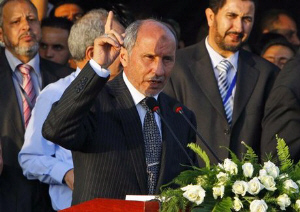Libyan National Transitional Council chief Mustafa Abdel Jalil said on Thursday that revealing the fate of Imam Sayyed Moussa al-Sadr is a priority for the Libyan authorities.
 Libyan National Transitional Council chief Mustafa Abdel Jalil said on Thursday that revealing the fate of Imam Sayyed Moussa al-Sadr is a priority for the Libyan authorities.
Libyan National Transitional Council chief Mustafa Abdel Jalil said on Thursday that revealing the fate of Imam Sayyed Moussa al-Sadr is a priority for the Libyan authorities.
On the sidelines of a news conference with Iranian Foreign Minister Ali Akbar Salehi in the Libyan city of Benghazi, Abdel Jalil said: "One of the priorities of the new government is to investigate what Gaddafi did to the Libyan people and people from different nations."
Once the inquiry was complete, Libya would give details to both the Iranian and Lebanese governments, he said.
Imam Sayyed Moussa Al-Sadr disappeared in 1978 on a trip to Libya, along with his two companions Sheikh Mohammad Yaaqoub and journalist Abbas Badreddine.
At the joint news conference with Salehi, Abdel Jalil said that "Gaddafi troops tried to kill people on 19 March.”
"If it were not for NATO, there would have been a massacre by Gaddafi troops. Libyan fighters brought victory on the ground but we must not forget the coalition's air strikes that supported and helped us."
On his part, Salehi said that Tehran was "prepared for the worst" and warned the United States against putting itself on "collision course" with his country.
Asked about news reports of Washington accelerating plans for a strike on Iran over its controversial nuclear program, Salehi said: "the U.S. has unfortunately lost wisdom and prudence in dealing with international issues. It depends only on power.”
"They have lost rationality; we are prepared for the worst but we hope they will think twice before they put themselves on a collision course with Iran," he added.
Concerning the NATO's military strikes in support of fighters battling to overthrow Dictator Moammar Gaddafi, Salehi said that the "NATO did not come to help without any reason ... they made mistakes. The president of Iran (Mahmoud Ahmadinejad) has criticized these mistakes.”
Washington and other Western powers suspect Tehran is seeking to build nuclear weapons, a charge Iran denies. It says its nuclear program is for purely peaceful ends to which it has a right.
Washington insisted on Wednesday that it remains committed to a diplomatic solution of the nuclear standoff with Iran as talk mounted in the 'Israeli entity' of a political push for a pre-emptive strike.